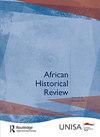Transgressing Disciplinary Bounds: Historiographical Directions in South Africa’s History/Heritage Affinities
IF 0.2
Q3 HISTORY
引用次数: 0
Abstract
Abstract A stronger history/heritage relationship with a much longer genealogy than has hitherto been examined is explored in this article. Deploying a cultural-historical method alongside the Tswaing and Mphebatho museums, this study attempts to open more and new space for exploring the making of South Africa’s history- and heritage-making. Investing both transdisciplinary fields with potentially transformative and truly decolonising qualities entrusts them with social roles necessary for indigenous society’s survival. Not only do the deployed methodologies allow an in-depth historical investigation of heritage sites, but they also warrant transcendence beyond entrenched binaries between history and heritage and colonial-sponsored temporal frames. In this way, the text explores long-held and previously little-treated indigenous concepts of history and heritage which evolved into the colonial and post-colonial eras. As locations whose heritage profiles embrace human and non-human worlds, the selected museums illustrate how a broadened eco-culture heritage interfaces with history and identity. The two museums therefore encapsulate memory, indigenous knowledge, and culture generated over time through complex or intricate linkages with landscape and nature.跨越学科界限:南非历史/遗产归属的史学方向
一个更强的历史/遗产关系与一个更长的家谱比迄今为止已经检查了探讨在这篇文章。本研究采用文化历史的方法,与Tswaing和Mphebatho博物馆一起,试图为探索南非的历史和遗产创造开辟更多的新空间。投资这两个具有潜在变革和真正非殖民化性质的跨学科领域,赋予它们对土著社会生存所必需的社会作用。部署的方法不仅允许对遗产地进行深入的历史调查,而且还保证超越历史和遗产以及殖民赞助的时间框架之间根深蒂固的二元对立。通过这种方式,本文探讨了长期持有和以前很少处理的历史和遗产的土著概念,这些概念演变成殖民和后殖民时代。作为包含人类和非人类世界遗产的地点,入选的博物馆展示了扩大的生态文化遗产如何与历史和身份相结合。因此,两座博物馆通过与景观和自然的复杂联系,浓缩了记忆、本土知识和文化。
本文章由计算机程序翻译,如有差异,请以英文原文为准。
求助全文
约1分钟内获得全文
求助全文

 求助内容:
求助内容: 应助结果提醒方式:
应助结果提醒方式:


